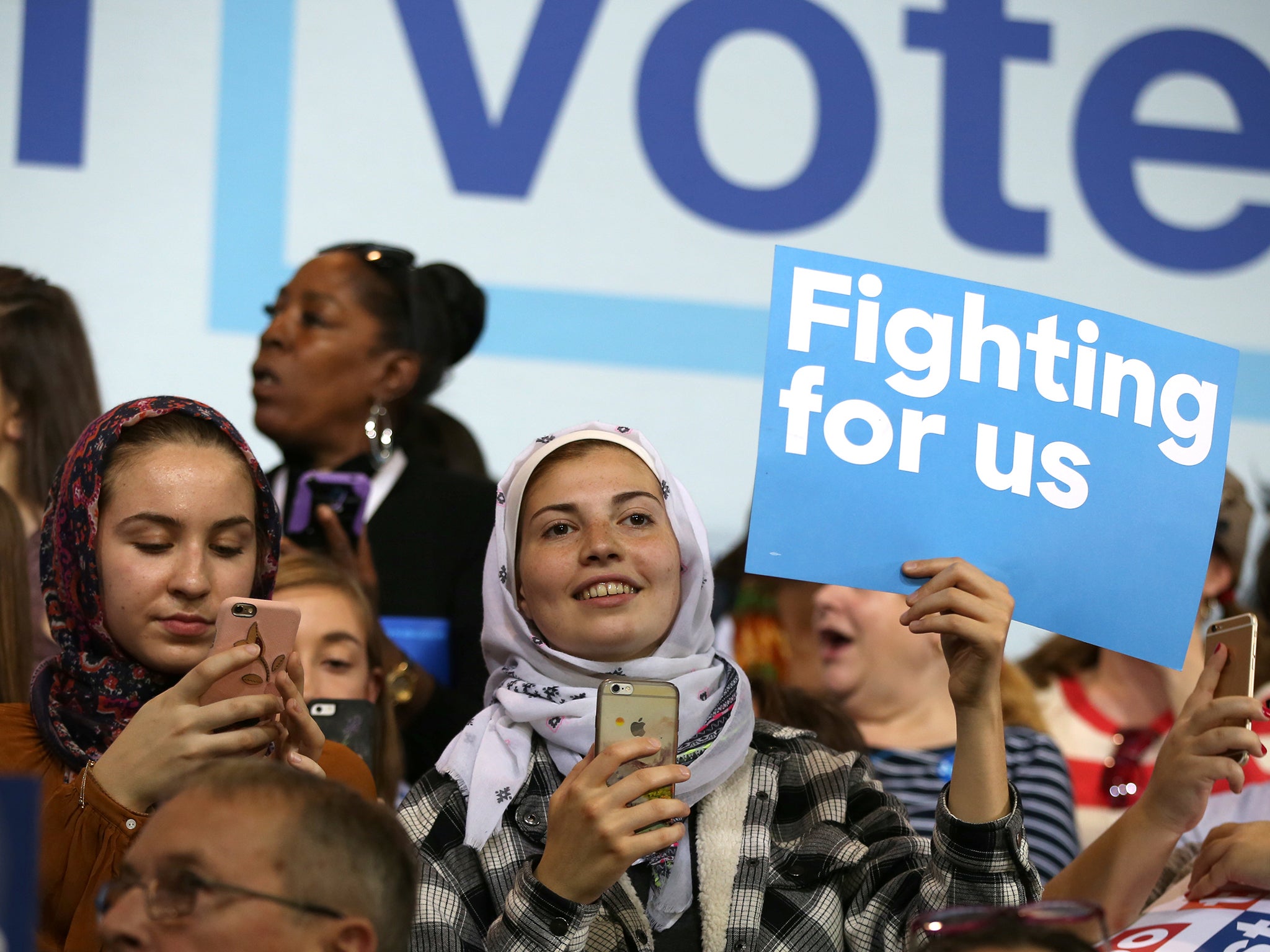Donald Trump and Hillary Clinton never talk to us, only about us, say 'demoralised' American-Muslims
'We're not able to talk about issues that impact us as citizens - education, jobs, things that any other voter would care about. It's a really demoralising way to be seen to be part of this country'

Your support helps us to tell the story
From reproductive rights to climate change to Big Tech, The Independent is on the ground when the story is developing. Whether it's investigating the financials of Elon Musk's pro-Trump PAC or producing our latest documentary, 'The A Word', which shines a light on the American women fighting for reproductive rights, we know how important it is to parse out the facts from the messaging.
At such a critical moment in US history, we need reporters on the ground. Your donation allows us to keep sending journalists to speak to both sides of the story.
The Independent is trusted by Americans across the entire political spectrum. And unlike many other quality news outlets, we choose not to lock Americans out of our reporting and analysis with paywalls. We believe quality journalism should be available to everyone, paid for by those who can afford it.
Your support makes all the difference.Many Muslim Americans cringe at the way they have been portrayed by both candidates during the US presidential campaign - either as potential jihadis or eyes and ears who can help the government's anti-terror efforts.
Those descriptions, offered by Donald Trump and Hillary Clinton respectively, are troubling to Muslims who complain they are being pigeonholed and their concerns on other issues ignored.
“I think that there is some level of dismissiveness about Arab-Americans and American-Muslims that allows candidates to talk about us, not really to us,” said Omar Baddar, a political analyst and media producer based in Washington.
Chaumtoli Huq, a lawyer from the New York City suburb of Yonkers, said: “We're not able to talk about issues that impact us as citizens - education, jobs, things that any other voter would care about. It's a really demoralising way to be seen to be part of this country.”
One of the campaign's more memorable moments for Muslim Americans unfolded at the Democratic National Convention in July, when a grieving Khizr Khan addressed delegates about his son, Humayun, an American soldier who was killed in Iraq.
The Republican candidate soon pushed back against Mr Khan's anti-Trump comments, setting up an almost unprecedented episode in which a presidential nominee criticised a military family that lost a loved one in a war zone.
Ms Huq and others said Mr Trump's campaign has clearly been the more negative one, starting with his call to ban foreign Muslims from entering the United States as an anti-terrorism measure.
In the second presidential debate in St Louis, Mr Trump answered a question about how to stop Islamophobia in America by saying American Muslims must report other Muslims engaging in dangerous behaviour.
He also repeated the false claim that neighbours of the San Bernardino, California, shooters saw bombs all over the floor in the shooters' home last year, but did not report it.
That led to a widely retweeted comment from Brooklyn College professor Moustafa Bayoumi, who posted: “I'm a Muslim, and I would like to report a crazy man threatening a woman on a stage in Missouri.”
By the time the debate ended, his retort had been retweeted more than 32,000 times and “liked” more than 43,000 times.
Mr Bayoumi said Muslim Americans “get exceptionalised to such a degree that their average Americanness disappears in the wind”.
But Mrs Clinton did not escape censure from Muslim Americans, who said that the Democratic nominee's public remarks had primarily revolved around recognising them for what they could do to support counter-terrorism efforts.
At that second debate, in answering the same question as Mr Trump, she said: “We need American Muslims to be part of our eyes and ears on our front lines. I've worked with a lot of different Muslim groups around America. I've met with a lot of them, and I've heard how important it is for them to feel that they are wanted and included and part of our country, part of our homeland security, and that's what I want to see.”
Nour Eidy, a freshman at the University of Michigan, grew up in the Detroit suburb of Dearborn, which is heavily Arab and Muslim. She was troubled by the call to root out radicals, mainly because she has not come across any.
“I don't know anything about terrorism. I don't know their game plans, their strategies,” she said. “We're just as victimised by them as anybody else.”
But Hussien Kazwini said he did not object to calls for Muslims to identify dangerous extremists. The college student in Toledo, Ohio, whose parents were born in Lebanon, said it was what every US citizen should do.
“We, at the end of the day, are around more Muslims at a mosque or an event,” he said. “Maybe we do have an ability to more easily see if someone is going over to the extreme side.”
Frustration with the race is enough to make Ramah Kudaimi want to skip voting altogether.
“People are so shocked by what Trump is saying, that he's - and he's so openly racist - that they are giving Hillary Clinton a pass,” the Washington DC organiser said. “The Democrats, frankly, have not necessarily done what is needed to also earn my vote as a Muslim American.”
In New York, Ahsia Badi, a 44-year-old health professional who has two children, said the campaign rhetoric had also affected how non-Muslims interacted with Muslims. “This sort of dialogue is forcing people to sit there and see their friends who happen to be Muslim, to be their 'Muslim friends,” she said.
AP
Join our commenting forum
Join thought-provoking conversations, follow other Independent readers and see their replies
Comments